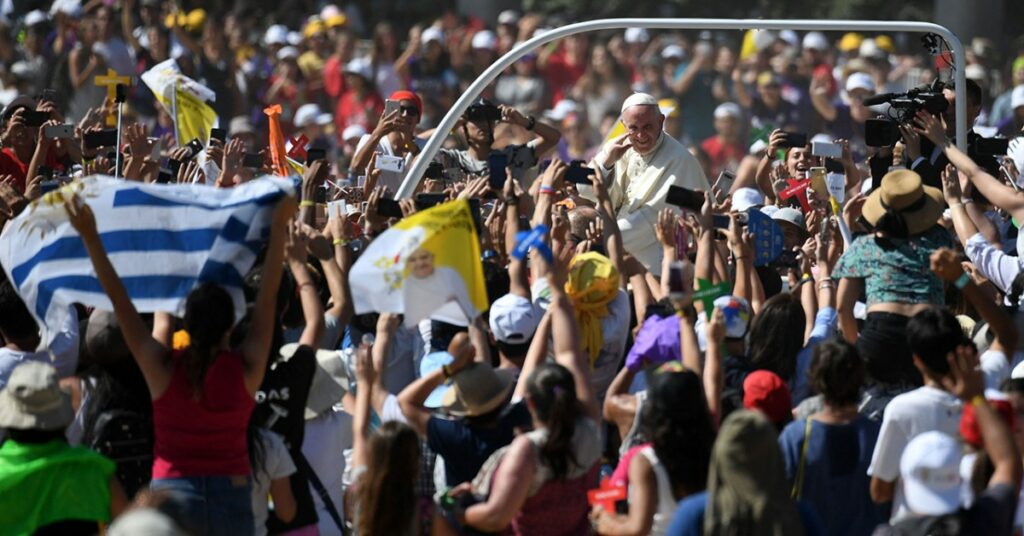Pope Francis waves to a crowd from the popemobile as he arrives at the National Shrine of Maipu in Santiago, Chile, in 2018. (Eitan Abramovich/AFP via Getty Images)
Pope Francis, a native of Argentina and the first pope from the Americas, is broadly popular in several Latin American countries. This data comes from a Pew Research Center survey of people in Argentina, Brazil, Chile, Colombia, Mexico and Peru conducted earlier this year.
In Brazil and Mexico, for instance, 68% of adults have a favorable opinion of the pope.
This Pew Research Center analysis explores public attitudes toward Pope Francis among adults in six Latin American countries and the United States.
This analysis draws on nationally representative surveys of 6,234 adults in Latin America conducted from Jan. 22 to April 27, 2024, in Spanish and Portuguese. Surveys were conducted face-to-face in Argentina, Brazil, Chile, Colombia, Mexico and Peru.
In the United States, we surveyed 12,693 respondents from Feb. 13 to 25, 2024. Most of the survey’s respondents (10,642) are members of the American Trends Panel, an online survey panel recruited through national random sampling of residential addresses, which gives nearly all U.S. adults a chance of selection.
The remaining respondents (2,051) are members of three other panels: the Ipsos KnowledgePanel, the NORC Amerispeak Panel and the SSRS Opinion Panel. All three are national survey panels recruited through random sampling (not “opt-in” polls). We used these additional panels to ensure that the survey would have enough Jewish and Muslim respondents to be able to report on their views. (While Jewish and Muslim respondents are not discussed in this particular analysis, they are discussed in other products based on this survey.)
The U.S. data is weighted to be representative of the U.S. adult population by gender, race, ethnicity, partisan affiliation, education, religious affiliation and other categories.
For more information about the U.S. data, refer to the ATP’s methodology and the methodology for our previous report that focused on opinions among U.S. Catholics. Here are the U.S. trend questions, along with responses, used in this analysis.
For the Latin American data, here is the question used for the analysis, along with responses, and the survey methodology.
This analysis was produced by Pew Research Center as part of the Pew-Templeton Global Religious Futures project, which analyzes religious change and its impact on societies around the world. Funding for the Global Religious Futures project comes from The Pew Charitable Trusts and the John Templeton Foundation (grant 63095). This publication does not necessarily reflect the views of the John Templeton Foundation.
Chile stands out, as only about half of adults there have a positive view of Francis. Still, favorable views are more common than unfavorable views (48% vs. 36%).
In the six countries surveyed – all among the region’s most populous – attitudes toward the pope are less positive than they were a decade ago.
For example, in Colombia, 83% of adults held a favorable view of Francis in late 2013 and early 2014 – roughly a year into his papacy. But in 2024, 72% of Colombians share this opinion.
The biggest decline in favorable attitudes has been in Argentina – the pope’s home country. While 91% of Argentines said a decade ago that they had a positive opinion of Francis, that share has dropped to 64% today.
There have also been two other significant changes in views of the pope:
Rising shares in all Latin American countries surveyed have an unfavorable view of the pope. In Mexico, for instance, adults today are three times more likely than they were a decade ago to voice a negative opinion of Francis (27% vs. 9%).
Fewer people do not give an opinion. This group includes people who say they don’t know who Pope Francis is. In 2013-14, it also included those who said they couldn’t assign a rating to him – perhaps due to the recency of his role.
While this analysis focuses on the overall adult populations of these countries – along with public attitudes in the United States – an accompanying report looks at the patterns in favorability among Catholics. Latin American Catholics are more likely than the region’s Protestants and religiously unaffiliated adults to have a favorable view of Francis, but the shares of Catholics who view the pope favorably are also declining.
Opinions of Pope Francis in the United States
In the U.S., most adults (57%) have a favorable opinion of Pope Francis. This is the same share who said this in 2013.
His favorability ratings in the U.S. reached high points in 2015 and 2017 – when seven-in-ten adults viewed him positively – before declining in the last few years.
There have been two other shifts in Americans’ views of the pope over the past decade. These are similar to the patterns in Latin America:
The share who has an unfavorable view of the pope roughly doubled. There was a marked increase beginning in September 2018.
The shares who either have not heard of Francis or refused to answer the question shrunk considerably.
Looking at specific religious groups in the U.S., Catholics (75%) are more likely than Protestants (51%) or the religiously unaffiliated (56%) to have positive views of Francis today.
For more on U.S. Catholics’ attitudes toward Pope Francis, refer to our recent report, “Majority of U.S. Catholics Express Favorable View of Pope Francis.”
Source link : http://www.bing.com/news/apiclick.aspx?ref=FexRss&aid=&tid=66f5688e5466457aae28f2aaf04d614a&url=https%3A%2F%2Fwww.pewresearch.org%2Fshort-reads%2F2024%2F09%2F26%2Fhow-people-in-latin-america-and-the-u-s-view-pope-francis%2F&c=7282388614802692076&mkt=en-us
Author :
Publish date : 2024-09-26 02:49:00
Copyright for syndicated content belongs to the linked Source.
